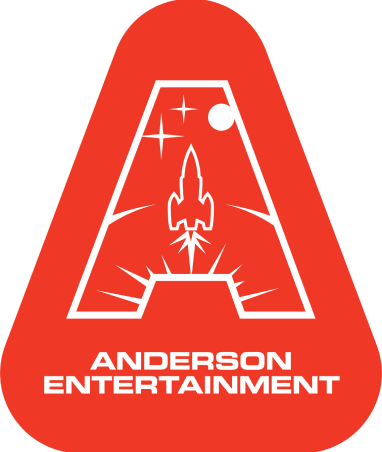The Legacy of Sylvia Anderson
8 Min read
Share
8 Min read
Share

Throughout the 1960s and into the 1970s the names of Gerry and Sylvia Anderson were a force to be reckoned with in the British television and film industry. Together this ‘husband and wife team’ co-created and produced some of the most spectacular and popular shows ever to appear on television, and even brought their ideas and concepts to the cinema screen in three big-budget feature films during the second half of the 1960s. However, following the couple’s separation in 1975, the idea of the pair being equally responsible for shows like Thunderbirds, UFO and the rest has sadly fallen out of public (and indeed fan) consciousness to a certain degree. The phrase ‘Gerry Anderson shows’ is now often used to describe shows that Sylvia co-created or co-produced and thus deserves equal credit for - so does that mean Sylvia at times gets ‘airbrushed out of history’?
 Thunderbirds co-creator Sylvia Anderson and her husband Gerry.
It’s an observation that certainly isn’t unfounded – at least, on the surface. When discussing the run of 'Anderson shows' from 1957’s The Adventures of Twizzle to 2005’s New Captain Scarlet as a single body of work, ‘the Anderson shows’ or ‘the Gerry Anderson shows’ is certainly an easier phrase to say than the more technically accurate ‘the Gerry and Sylvia Anderson shows but also the ones Gerry made after 1975 that Sylvia wasn’t involved in’ – and even that wouldn’t be remotely fair to all the other talented people who also worked regularly on those shows!
Thunderbirds co-creator Sylvia Anderson and her husband Gerry.
It’s an observation that certainly isn’t unfounded – at least, on the surface. When discussing the run of 'Anderson shows' from 1957’s The Adventures of Twizzle to 2005’s New Captain Scarlet as a single body of work, ‘the Anderson shows’ or ‘the Gerry Anderson shows’ is certainly an easier phrase to say than the more technically accurate ‘the Gerry and Sylvia Anderson shows but also the ones Gerry made after 1975 that Sylvia wasn’t involved in’ – and even that wouldn’t be remotely fair to all the other talented people who also worked regularly on those shows!
 Sylvia working under the supervision of Stingray's Commander Shore and Atlanta.
Unfortunately, this has the unintentional side effect of certain resources appearing to overlook Sylvia’s contributions, but it cannot be stated enough just how integral she was to the creation and realisation of the shows that she co-created and co-produced with her husband Gerry during the Anderson ‘golden era’ from Supercar through to the first season of Space:1999. From working on the initial concept of each series to providing story ideas for episodes, Sylvia also brought a human touch that helped the puppet stars of these shows connect with their audience - and in the process she created one of the most iconic British television characters along the way!
If we think of the ‘Anderson universe’ as having ‘begun’ with The Adventures of Twizzle (another often-used oversimplification that doesn't quite paint an accurate picture of events), then Sylvia can be said to have been there from the very beginning, serving as a production assistant on APF shows up until Four Feather Falls. Following her marriage to Gerry Anderson during production of Supercar (until which she was Sylvia Thamm) her responsibilities within the company increased, and she began to have a firmer hand in shaping the world and characters of their various shows.
Sylvia working under the supervision of Stingray's Commander Shore and Atlanta.
Unfortunately, this has the unintentional side effect of certain resources appearing to overlook Sylvia’s contributions, but it cannot be stated enough just how integral she was to the creation and realisation of the shows that she co-created and co-produced with her husband Gerry during the Anderson ‘golden era’ from Supercar through to the first season of Space:1999. From working on the initial concept of each series to providing story ideas for episodes, Sylvia also brought a human touch that helped the puppet stars of these shows connect with their audience - and in the process she created one of the most iconic British television characters along the way!
If we think of the ‘Anderson universe’ as having ‘begun’ with The Adventures of Twizzle (another often-used oversimplification that doesn't quite paint an accurate picture of events), then Sylvia can be said to have been there from the very beginning, serving as a production assistant on APF shows up until Four Feather Falls. Following her marriage to Gerry Anderson during production of Supercar (until which she was Sylvia Thamm) her responsibilities within the company increased, and she began to have a firmer hand in shaping the world and characters of their various shows.
 During the first season of Supercar Gerry and Sylvia would occasionally collaborate on scripts, and are co-credited with writing the scripts for all thirteen episodes of the show’s second season. From Fireball XL5 onwards however the pattern would generally be that Gerry and Sylvia would both devise the new show’s format and characters, then write only the first episode plus one or two more (if that). Sylvia would however serve as a ‘guardian’ of sorts for the show’s characters throughout the production, being credited on various shows for ‘character supervision’, ‘character visualisation’ or some variation thereof. This essentially involved keeping the characters consistent from episode to episode, establishing and developing their relationships with each other and making sure that the scripts featured a human element to go with the action and explosions. With Thunderbirds the longer running time of each episode provided ample time for just that, and Sylvia would have been heavily involved with creating character moments for the regulars as well as establishing sympathetic guest characters before they were thrown into mortal danger. Her focus on characterisation helped bring the Supermarionation puppets to life in a way that would not have happened had the shows been solely focused on hi-tech machinery and huge explosions. It was important that viewers believed these characters had a life in between the weekly disasters they faced, and Sylvia ensured that that illusion was maintained throughout the runs of their respective shows.
During the first season of Supercar Gerry and Sylvia would occasionally collaborate on scripts, and are co-credited with writing the scripts for all thirteen episodes of the show’s second season. From Fireball XL5 onwards however the pattern would generally be that Gerry and Sylvia would both devise the new show’s format and characters, then write only the first episode plus one or two more (if that). Sylvia would however serve as a ‘guardian’ of sorts for the show’s characters throughout the production, being credited on various shows for ‘character supervision’, ‘character visualisation’ or some variation thereof. This essentially involved keeping the characters consistent from episode to episode, establishing and developing their relationships with each other and making sure that the scripts featured a human element to go with the action and explosions. With Thunderbirds the longer running time of each episode provided ample time for just that, and Sylvia would have been heavily involved with creating character moments for the regulars as well as establishing sympathetic guest characters before they were thrown into mortal danger. Her focus on characterisation helped bring the Supermarionation puppets to life in a way that would not have happened had the shows been solely focused on hi-tech machinery and huge explosions. It was important that viewers believed these characters had a life in between the weekly disasters they faced, and Sylvia ensured that that illusion was maintained throughout the runs of their respective shows.
 Sylvia contemplating future adventures for her Fireball XL5 counterpart Dr. Venus.
It was during production of Thunderbirds that Sylvia would create the character that she will forever be most associated with; that of Lady Penelope Creighton-Ward, International Rescue’s London agent. Feeling that the predominately male writing team did not always understand or best serve the character Sylvia often took it upon herself to provide them with ideas, and those ideas helped lift Penelope from a minor character to centre stage. As Penelope’s voice artist (and the original inspiration for the overall look of the puppet, according to puppeteer Mary Turner) Sylvia had a lot invested in the character, and by the time production wrapped on the Thunderbirds television series (and two feature films) Lady Penelope had, along with her faithful manservant Parker, become the breakout star of the show.
In addition to directing many of the fortnightly voice recording sessions Sylvia could also be heard providing voices herself in many Supermarionation episodes. Her regular voice roles included the characters of Jimmy Gibson in Supercar, Venus, Jonathan and Eleanor Zero in Fireball XL5, Lady Penelope in Thunderbirds, Melody Angel in Captain Scarlet and the Mysterons, Mrs Harris in Joe 90 and Mrs Appleby in The Secret Service. She was also frequently heard performing female and child guest roles throughout the Supermarionation era, and gave voice to Stingray's Marina twice; in the episode Raptures of the Deep and the audio story Marina Speaks. Sylvia was also heavily involved in the casting process for most of the shows she worked on, from selecting many of the voice artists who voiced the Supermarionation characters right through to choosing the extras who populated the backgrounds of SHADO HQ and Main Mission.
Sylvia contemplating future adventures for her Fireball XL5 counterpart Dr. Venus.
It was during production of Thunderbirds that Sylvia would create the character that she will forever be most associated with; that of Lady Penelope Creighton-Ward, International Rescue’s London agent. Feeling that the predominately male writing team did not always understand or best serve the character Sylvia often took it upon herself to provide them with ideas, and those ideas helped lift Penelope from a minor character to centre stage. As Penelope’s voice artist (and the original inspiration for the overall look of the puppet, according to puppeteer Mary Turner) Sylvia had a lot invested in the character, and by the time production wrapped on the Thunderbirds television series (and two feature films) Lady Penelope had, along with her faithful manservant Parker, become the breakout star of the show.
In addition to directing many of the fortnightly voice recording sessions Sylvia could also be heard providing voices herself in many Supermarionation episodes. Her regular voice roles included the characters of Jimmy Gibson in Supercar, Venus, Jonathan and Eleanor Zero in Fireball XL5, Lady Penelope in Thunderbirds, Melody Angel in Captain Scarlet and the Mysterons, Mrs Harris in Joe 90 and Mrs Appleby in The Secret Service. She was also frequently heard performing female and child guest roles throughout the Supermarionation era, and gave voice to Stingray's Marina twice; in the episode Raptures of the Deep and the audio story Marina Speaks. Sylvia was also heavily involved in the casting process for most of the shows she worked on, from selecting many of the voice artists who voiced the Supermarionation characters right through to choosing the extras who populated the backgrounds of SHADO HQ and Main Mission.
 On UFO, Sylvia also took a hand in the look of the series when it came to what the show’s characters would be wearing. Continuing in the same style as the costumes seen in the feature film Doppelgänger (partly because UFO would be re-using many of those costumes), she worked with designer Keith Wilson to create such iconic outfits as those of the Skydiver and Moonbase operatives; Wilson would sketch designs for the costumes, often from her suggestions, while Sylvia would select colours and materials. Sylvia also had final say over which costumes would ultimately appear on screen, as well as various hair and makeup-related decisions, and her work on UFO saw her earn the on-screen prestigious credit; 'Century 21 Fashions designed by Sylvia Anderson'.
Following the rebranding of Century 21 Productions as Group Three Productions with the end of UFO, Sylvia would earn her first solo writing credit with her script for The Protectors episode With a Little Help from My Friends, in which Harry Rule was reunited with his estranged wife following the kidnapping of their son. She also wrote the screenplay for the Andersons’ unaired pilot film The Investigator, based on a story by Shane Rimmer, for which both former Thunderbirds stars would also provide voices.
On UFO, Sylvia also took a hand in the look of the series when it came to what the show’s characters would be wearing. Continuing in the same style as the costumes seen in the feature film Doppelgänger (partly because UFO would be re-using many of those costumes), she worked with designer Keith Wilson to create such iconic outfits as those of the Skydiver and Moonbase operatives; Wilson would sketch designs for the costumes, often from her suggestions, while Sylvia would select colours and materials. Sylvia also had final say over which costumes would ultimately appear on screen, as well as various hair and makeup-related decisions, and her work on UFO saw her earn the on-screen prestigious credit; 'Century 21 Fashions designed by Sylvia Anderson'.
Following the rebranding of Century 21 Productions as Group Three Productions with the end of UFO, Sylvia would earn her first solo writing credit with her script for The Protectors episode With a Little Help from My Friends, in which Harry Rule was reunited with his estranged wife following the kidnapping of their son. She also wrote the screenplay for the Andersons’ unaired pilot film The Investigator, based on a story by Shane Rimmer, for which both former Thunderbirds stars would also provide voices.
 A photo call during production of the Space:1999 episode Earthbound.
By the end of filming on the first season of Space:1999 however tensions between Gerry and Sylvia that had been building steadily for many years came to a head, culminating in their breakup immediately after the wrap party (although they would not be divorced until 1980) and her departure from Group Three. While Gerry was largely responsible for assembling the team that produced their shows Sylvia was often the glue that held that team together, and her departure from Space:1999 was keenly felt by the returning cast and crew when they resumed shooting on the second season - although Sylvia would still receive a credit for co-creating the show with Gerry at the very end of the closing titles.
A photo call during production of the Space:1999 episode Earthbound.
By the end of filming on the first season of Space:1999 however tensions between Gerry and Sylvia that had been building steadily for many years came to a head, culminating in their breakup immediately after the wrap party (although they would not be divorced until 1980) and her departure from Group Three. While Gerry was largely responsible for assembling the team that produced their shows Sylvia was often the glue that held that team together, and her departure from Space:1999 was keenly felt by the returning cast and crew when they resumed shooting on the second season - although Sylvia would still receive a credit for co-creating the show with Gerry at the very end of the closing titles.
 Many long-time friends and colleagues have commented over the years that they found this period a difficult one, with their loyalties to both Gerry and Sylvia being strained under the bitterness of their breakup. Captain Scarlet and UFO star Ed Bishop later commented on the irony of their separation considering the strength of their working partnership that produced so many classic shows; “Their professional relationship was made in heaven, because he was an expert at what he did and she was an expert at what she did, and the two of them combined was a double whammy you couldn’t stop.”
Sylvia’s career would continue to flourish following her split from Gerry. She spent thirty years as a London-based talent scout for HBO, created new series concepts and continued her writing with such books as her 1983 novel Love and Hisses and her 1991 autobiography Yes M’Lady (which she later heavily revised for re-publication in 2007 as My Fab Years). She would also return to Thunderbirds and the character of Lady Penelope in subsequent productions, most notably a 1994 episode of sitcom Absolutely Fabulous and the 2014 documentary Filmed in Supermarionation. She was a strong supporter of the 2004 live-action Thunderbirds movie, and also voiced the guest role of Lady Penelope’s Aunt Sylvia in a 2015 episode of CGI remake Thunderbirds are Go – a fitting tribute to close out her acting career.
Sylvia Anderson passed away on March 15th 2016, at the age of 88. A popular and much-loved guest at conventions, her work will forever live on as each generation discovers the universe she helped to create, and the adventures of Lady Penelope, Melody Angel and her many other puppet counterparts will continue to inspire and entertain long into the future. Ultimately, the shows that still bring so many fans together in celebration were not the result of the work of just one man, but the collaborative efforts of a great many talented people – even if brevity often requires that it doesn’t always sound like that. Sylvia Anderson was undoubtedly one of the most important of them all, and her legacy deserves to be celebrated as much as any of theirs - because without her, the shows we love would certainly be very different...
Many long-time friends and colleagues have commented over the years that they found this period a difficult one, with their loyalties to both Gerry and Sylvia being strained under the bitterness of their breakup. Captain Scarlet and UFO star Ed Bishop later commented on the irony of their separation considering the strength of their working partnership that produced so many classic shows; “Their professional relationship was made in heaven, because he was an expert at what he did and she was an expert at what she did, and the two of them combined was a double whammy you couldn’t stop.”
Sylvia’s career would continue to flourish following her split from Gerry. She spent thirty years as a London-based talent scout for HBO, created new series concepts and continued her writing with such books as her 1983 novel Love and Hisses and her 1991 autobiography Yes M’Lady (which she later heavily revised for re-publication in 2007 as My Fab Years). She would also return to Thunderbirds and the character of Lady Penelope in subsequent productions, most notably a 1994 episode of sitcom Absolutely Fabulous and the 2014 documentary Filmed in Supermarionation. She was a strong supporter of the 2004 live-action Thunderbirds movie, and also voiced the guest role of Lady Penelope’s Aunt Sylvia in a 2015 episode of CGI remake Thunderbirds are Go – a fitting tribute to close out her acting career.
Sylvia Anderson passed away on March 15th 2016, at the age of 88. A popular and much-loved guest at conventions, her work will forever live on as each generation discovers the universe she helped to create, and the adventures of Lady Penelope, Melody Angel and her many other puppet counterparts will continue to inspire and entertain long into the future. Ultimately, the shows that still bring so many fans together in celebration were not the result of the work of just one man, but the collaborative efforts of a great many talented people – even if brevity often requires that it doesn’t always sound like that. Sylvia Anderson was undoubtedly one of the most important of them all, and her legacy deserves to be celebrated as much as any of theirs - because without her, the shows we love would certainly be very different...
 Lady Penelope with her best friend Sylvia Anderson.
Lady Penelope with her best friend Sylvia Anderson.
 Thunderbirds co-creator Sylvia Anderson and her husband Gerry.
Thunderbirds co-creator Sylvia Anderson and her husband Gerry. Sylvia working under the supervision of Stingray's Commander Shore and Atlanta.
Sylvia working under the supervision of Stingray's Commander Shore and Atlanta. During the first season of Supercar Gerry and Sylvia would occasionally collaborate on scripts, and are co-credited with writing the scripts for all thirteen episodes of the show’s second season. From Fireball XL5 onwards however the pattern would generally be that Gerry and Sylvia would both devise the new show’s format and characters, then write only the first episode plus one or two more (if that). Sylvia would however serve as a ‘guardian’ of sorts for the show’s characters throughout the production, being credited on various shows for ‘character supervision’, ‘character visualisation’ or some variation thereof. This essentially involved keeping the characters consistent from episode to episode, establishing and developing their relationships with each other and making sure that the scripts featured a human element to go with the action and explosions. With Thunderbirds the longer running time of each episode provided ample time for just that, and Sylvia would have been heavily involved with creating character moments for the regulars as well as establishing sympathetic guest characters before they were thrown into mortal danger. Her focus on characterisation helped bring the Supermarionation puppets to life in a way that would not have happened had the shows been solely focused on hi-tech machinery and huge explosions. It was important that viewers believed these characters had a life in between the weekly disasters they faced, and Sylvia ensured that that illusion was maintained throughout the runs of their respective shows.
During the first season of Supercar Gerry and Sylvia would occasionally collaborate on scripts, and are co-credited with writing the scripts for all thirteen episodes of the show’s second season. From Fireball XL5 onwards however the pattern would generally be that Gerry and Sylvia would both devise the new show’s format and characters, then write only the first episode plus one or two more (if that). Sylvia would however serve as a ‘guardian’ of sorts for the show’s characters throughout the production, being credited on various shows for ‘character supervision’, ‘character visualisation’ or some variation thereof. This essentially involved keeping the characters consistent from episode to episode, establishing and developing their relationships with each other and making sure that the scripts featured a human element to go with the action and explosions. With Thunderbirds the longer running time of each episode provided ample time for just that, and Sylvia would have been heavily involved with creating character moments for the regulars as well as establishing sympathetic guest characters before they were thrown into mortal danger. Her focus on characterisation helped bring the Supermarionation puppets to life in a way that would not have happened had the shows been solely focused on hi-tech machinery and huge explosions. It was important that viewers believed these characters had a life in between the weekly disasters they faced, and Sylvia ensured that that illusion was maintained throughout the runs of their respective shows.
 Sylvia contemplating future adventures for her Fireball XL5 counterpart Dr. Venus.
Sylvia contemplating future adventures for her Fireball XL5 counterpart Dr. Venus. On UFO, Sylvia also took a hand in the look of the series when it came to what the show’s characters would be wearing. Continuing in the same style as the costumes seen in the feature film Doppelgänger (partly because UFO would be re-using many of those costumes), she worked with designer Keith Wilson to create such iconic outfits as those of the Skydiver and Moonbase operatives; Wilson would sketch designs for the costumes, often from her suggestions, while Sylvia would select colours and materials. Sylvia also had final say over which costumes would ultimately appear on screen, as well as various hair and makeup-related decisions, and her work on UFO saw her earn the on-screen prestigious credit; 'Century 21 Fashions designed by Sylvia Anderson'.
Following the rebranding of Century 21 Productions as Group Three Productions with the end of UFO, Sylvia would earn her first solo writing credit with her script for The Protectors episode With a Little Help from My Friends, in which Harry Rule was reunited with his estranged wife following the kidnapping of their son. She also wrote the screenplay for the Andersons’ unaired pilot film The Investigator, based on a story by Shane Rimmer, for which both former Thunderbirds stars would also provide voices.
On UFO, Sylvia also took a hand in the look of the series when it came to what the show’s characters would be wearing. Continuing in the same style as the costumes seen in the feature film Doppelgänger (partly because UFO would be re-using many of those costumes), she worked with designer Keith Wilson to create such iconic outfits as those of the Skydiver and Moonbase operatives; Wilson would sketch designs for the costumes, often from her suggestions, while Sylvia would select colours and materials. Sylvia also had final say over which costumes would ultimately appear on screen, as well as various hair and makeup-related decisions, and her work on UFO saw her earn the on-screen prestigious credit; 'Century 21 Fashions designed by Sylvia Anderson'.
Following the rebranding of Century 21 Productions as Group Three Productions with the end of UFO, Sylvia would earn her first solo writing credit with her script for The Protectors episode With a Little Help from My Friends, in which Harry Rule was reunited with his estranged wife following the kidnapping of their son. She also wrote the screenplay for the Andersons’ unaired pilot film The Investigator, based on a story by Shane Rimmer, for which both former Thunderbirds stars would also provide voices.
 A photo call during production of the Space:1999 episode Earthbound.
A photo call during production of the Space:1999 episode Earthbound. Many long-time friends and colleagues have commented over the years that they found this period a difficult one, with their loyalties to both Gerry and Sylvia being strained under the bitterness of their breakup. Captain Scarlet and UFO star Ed Bishop later commented on the irony of their separation considering the strength of their working partnership that produced so many classic shows; “Their professional relationship was made in heaven, because he was an expert at what he did and she was an expert at what she did, and the two of them combined was a double whammy you couldn’t stop.”
Sylvia’s career would continue to flourish following her split from Gerry. She spent thirty years as a London-based talent scout for HBO, created new series concepts and continued her writing with such books as her 1983 novel Love and Hisses and her 1991 autobiography Yes M’Lady (which she later heavily revised for re-publication in 2007 as My Fab Years). She would also return to Thunderbirds and the character of Lady Penelope in subsequent productions, most notably a 1994 episode of sitcom Absolutely Fabulous and the 2014 documentary Filmed in Supermarionation. She was a strong supporter of the 2004 live-action Thunderbirds movie, and also voiced the guest role of Lady Penelope’s Aunt Sylvia in a 2015 episode of CGI remake Thunderbirds are Go – a fitting tribute to close out her acting career.
Sylvia Anderson passed away on March 15th 2016, at the age of 88. A popular and much-loved guest at conventions, her work will forever live on as each generation discovers the universe she helped to create, and the adventures of Lady Penelope, Melody Angel and her many other puppet counterparts will continue to inspire and entertain long into the future. Ultimately, the shows that still bring so many fans together in celebration were not the result of the work of just one man, but the collaborative efforts of a great many talented people – even if brevity often requires that it doesn’t always sound like that. Sylvia Anderson was undoubtedly one of the most important of them all, and her legacy deserves to be celebrated as much as any of theirs - because without her, the shows we love would certainly be very different...
Many long-time friends and colleagues have commented over the years that they found this period a difficult one, with their loyalties to both Gerry and Sylvia being strained under the bitterness of their breakup. Captain Scarlet and UFO star Ed Bishop later commented on the irony of their separation considering the strength of their working partnership that produced so many classic shows; “Their professional relationship was made in heaven, because he was an expert at what he did and she was an expert at what she did, and the two of them combined was a double whammy you couldn’t stop.”
Sylvia’s career would continue to flourish following her split from Gerry. She spent thirty years as a London-based talent scout for HBO, created new series concepts and continued her writing with such books as her 1983 novel Love and Hisses and her 1991 autobiography Yes M’Lady (which she later heavily revised for re-publication in 2007 as My Fab Years). She would also return to Thunderbirds and the character of Lady Penelope in subsequent productions, most notably a 1994 episode of sitcom Absolutely Fabulous and the 2014 documentary Filmed in Supermarionation. She was a strong supporter of the 2004 live-action Thunderbirds movie, and also voiced the guest role of Lady Penelope’s Aunt Sylvia in a 2015 episode of CGI remake Thunderbirds are Go – a fitting tribute to close out her acting career.
Sylvia Anderson passed away on March 15th 2016, at the age of 88. A popular and much-loved guest at conventions, her work will forever live on as each generation discovers the universe she helped to create, and the adventures of Lady Penelope, Melody Angel and her many other puppet counterparts will continue to inspire and entertain long into the future. Ultimately, the shows that still bring so many fans together in celebration were not the result of the work of just one man, but the collaborative efforts of a great many talented people – even if brevity often requires that it doesn’t always sound like that. Sylvia Anderson was undoubtedly one of the most important of them all, and her legacy deserves to be celebrated as much as any of theirs - because without her, the shows we love would certainly be very different...
 Lady Penelope with her best friend Sylvia Anderson.
Lady Penelope with her best friend Sylvia Anderson.
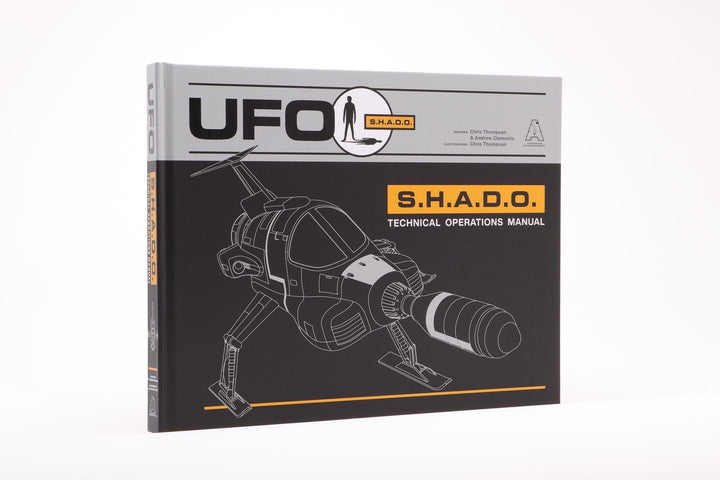


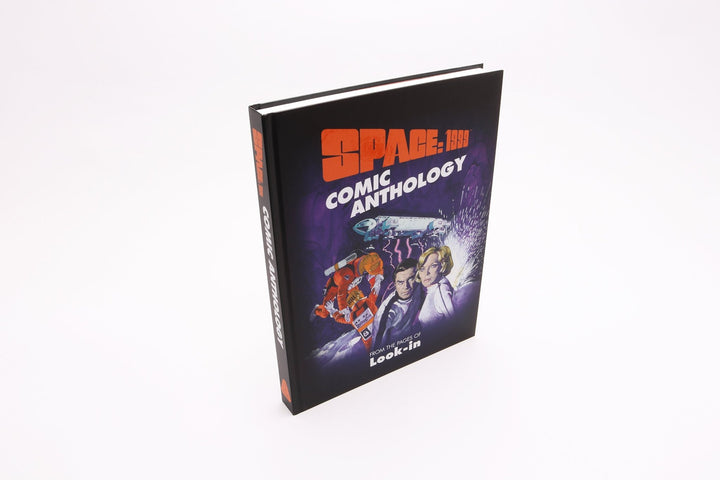
![Fireball XL5 World Space Patrol Technical Operations Manual [HARDCOVER BOOK] - The Gerry Anderson Store](http://gerryanderson.com/cdn/shop/files/fireball-xl5-world-space-patrol-technical-operations-manual-hardcover-book-290050.jpg?v=1711729272&width=720)
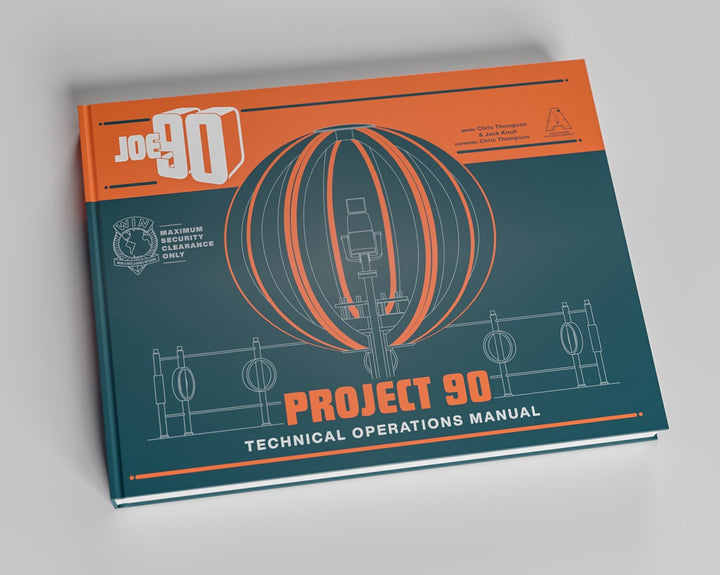
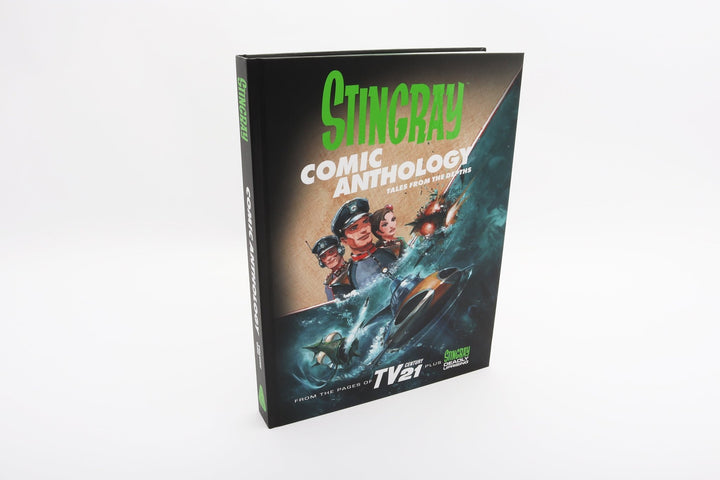

![Stingray Comic Anthology Volume Two – Battle Lines [HARDCOVER] - The Gerry Anderson Store](http://gerryanderson.com/cdn/shop/files/stingray-comic-anthology-volume-two-battle-lines-hardcover-107681.jpg?v=1738856151&width=720)
![Space: 1999 and UFO Book Bundle - Signed Limited Editions [HARDCOVER NOVELS] - The Gerry Anderson Store](http://gerryanderson.com/cdn/shop/files/space-1999-and-ufo-book-bundle-signed-limited-editions-hardcover-novels-589446.jpg?v=1718836845&width=720)
![Stingray WASP Technical Operations Manual Special Limited Edition [HARDCOVER BOOK] - The Gerry Anderson Store](http://gerryanderson.com/cdn/shop/files/stingray-wasp-technical-operations-manual-special-limited-edition-hardcover-book-991914.jpg?v=1732922875&width=720)



